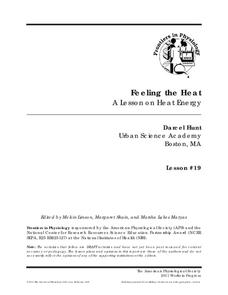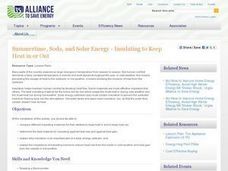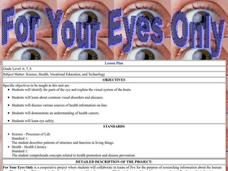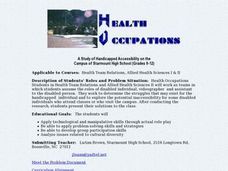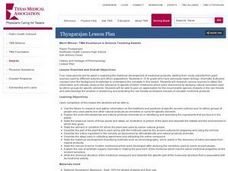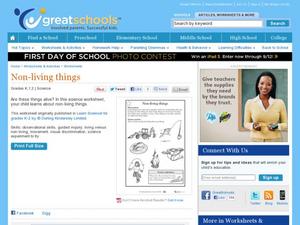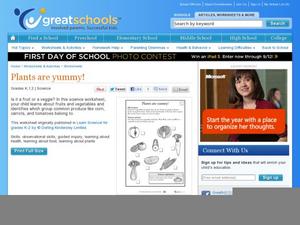American Physiological Society
Sticky Adaptations A Lesson on Natural Selection
Now you see it, now you don't! The stick bug exhibits the ability to disappear into a wooded environment. Why does this adaptation manifest in some species, but not in others? Life science students explore animal adaptations in nature...
American Physiological Society
Effects of Environment on Enzymes
Much like the tale of Humpty Dumpty, proteins, once altered, will never be the same again. Honors and pre-AP biology classes explore the delicate world of enzymes via a Webquest and lab experiment. The teacher's guide contains all...
American Physiological Society
Thermal Insulators: Keep it Hot!
There's nothing like a cup of hot chocolate on a chilly winter's day. Except for when that hot chocolate quickly becomes lukewarm chocolate ... or even cold chocolate. What material provides the best insulation to keep the chocolate from...
American Physiological Society
Did I Observe it or Infer it?
Take the mystery out of inquiry! When young scientists learn to use their keen powers of observation to make smart inferences about a situation, they are well on their way to understanding what the scientific method is all about. Using...
American Physiological Society
What Environmental Conditions Lead to the Hatching of Brine Shrimp?
Will changing the environment in which brine shrimp live impact their reproductive success? Young scientists get hands-on experience studying the habitat of brine shrimp in a two-week immersion instructional activity. The teacher's guide...
American Physiological Society
How Does the Density of a Liquid Affect the Buoyancy of an Object?
Here's a lesson plan that will really float your boat! Introduce physical science scholars to the relationship between buoyancy and density through an assortment of individual and collaborative exercises. Lab groups work together to...
American Physiological Society
Why is Kettle Corn Cooked in Copper Pots?
The kitchen — it's not just for eating anymore! Specific heat is often a difficult concept to grasp, so give it context by relating it to cooking. Learners gain experience in the principles of thermal energy transfer by designing an...
American Physiological Society
Sit On It
How do product designers come up with the variety of things we see in stores and on TV every day? They identify a need, then create something that meets that need. Sounds simple, right? A two-week lesson puts seventh graders in that role...
American Physiological Society
Feeling the Heat
How do the changing seasons affect the homes where we live? This question is at the forefront of engineering and design projects. Challenge your physical science class to step into the role of an architect to build a model home capable...
American Physiological Society
An Inquiry into Alcoholic Fermentation
Introduce life science students to their new "best buds" yeast! Using a wide variety of materials, lab groups design an experiment that illustrates how yeast acquires the resources it needs to undergo cellular respiration. The teacher's...
Curated OER
Insulation: Keeping Heat In or Out
Middle schoolers compare different materials on their ability to insulate. They identify the best materials for keeping heat in and keeping heat out. They also examine the importance of insulating homes.
Curated OER
Window Treatments for Energy Savings
Middle schoolers participate in an activity in which they determine which rooms are the warmest and coldest and explain why that is the case. They identify the types of energy saving window treatments and list their advantages and...
Curated OER
The Formation of Fossil Fuels
Students participate in an activity in which they explain the difference between renewable and nonrenewable sources of energy. They discover why the supply of fossil fuels is limited and practice using new vocabulary.
Curated OER
What Does It Cost to Use It?
Students investigate how electrical usage is counted. For this electricity lesson, students research an electric bill and define terms such as watts and kilowatts. Students calculate the average electricity cost per year by using a...
Curated OER
For Your Eyes Only
Middle schoolers complete several activities in a unit related to the eye. In this eye lesson, students work in groups to research information about the human eye and create a multimedia presentation. They research anatomy of the eye,...
Curated OER
Growing
Growing is part of being a living thing. Kindergartners decide which illustrations represent the life cycle of a living thing, then put a check mark next to the correct pictures. They then examine their own growth on a height chart.
Royal Society of Chemistry
Chemistry Masterclass—Chemistry Outreach
Immerse your chemistry class in the world of organic chemistry! Science scholars isolate acetaminophen from an over-the-counter sample during an intense and interesting lab. Groups use many different separation and analysis techniques to...
Curated OER
Proper Hygiene
Third graders discuss the importance of personal hygiene and cleanliness. They examine why good oral hygiene is a significant part of maintaining a healthy body. They focus on the need for daily baths, hair care, and teeth cleaning. They...
Curated OER
A Study of Handicapped Accessibility on the Campus of Starmount High School
Students apply technological and manipulative skills through actual role play. They apply problem solving skills and strategies. Students develop group participation skills. They analyze issues related to cultural diversity.
Curated OER
History and Heritage of Pharmacology
Twelfth graders research various sources to obtain the information and critically analyze the relevance to specific modern medicines which were discovered by studying natural remedies used by ethnic groups for specific ailments.
Smithsonian Institution
Watching Crystals Grow
Amazing science can sometimes happen right before your eyes! The class gets cozy as they watch crystals grow. They use Epsom salts, rocks, and food coloring to create crystals. They'll observe the entire process, documenting every step...
Curated OER
Interplanetary Travel Guide
In groups of six, middle school space scientists create an imaginative travel brochure for attracting visitors to the planet Mars. Information must include surface features and atmospheric conditions. Although time-consuming, this is a...
Curated OER
Non-living Things
Very young scientists circle the things on the instructional activity that they think are living things. Most of the pictures are of non-living things. A handy instructional activity to use during any initial discussion about living vs....
Curated OER
Plants are yummy!
Is it a fruit or a vegetable? Youngsters place an F next to each fruit they see and a V next to the vegetables. Corn is tricky. It is a grass, so it's actually not a fruit or a vegetable, but a grain!
Other popular searches
- Career Choices in Health Field
- Math for Health Careers
- Health Careers Powerpoint
- Health Careers Planner
- Technology in Health Careers
- Investigate Health Careers
- Therapeutic Health Careers
- Health Careers Facilities
- Science and Health Careers
- Careers in Health
- Career Clusters Health










